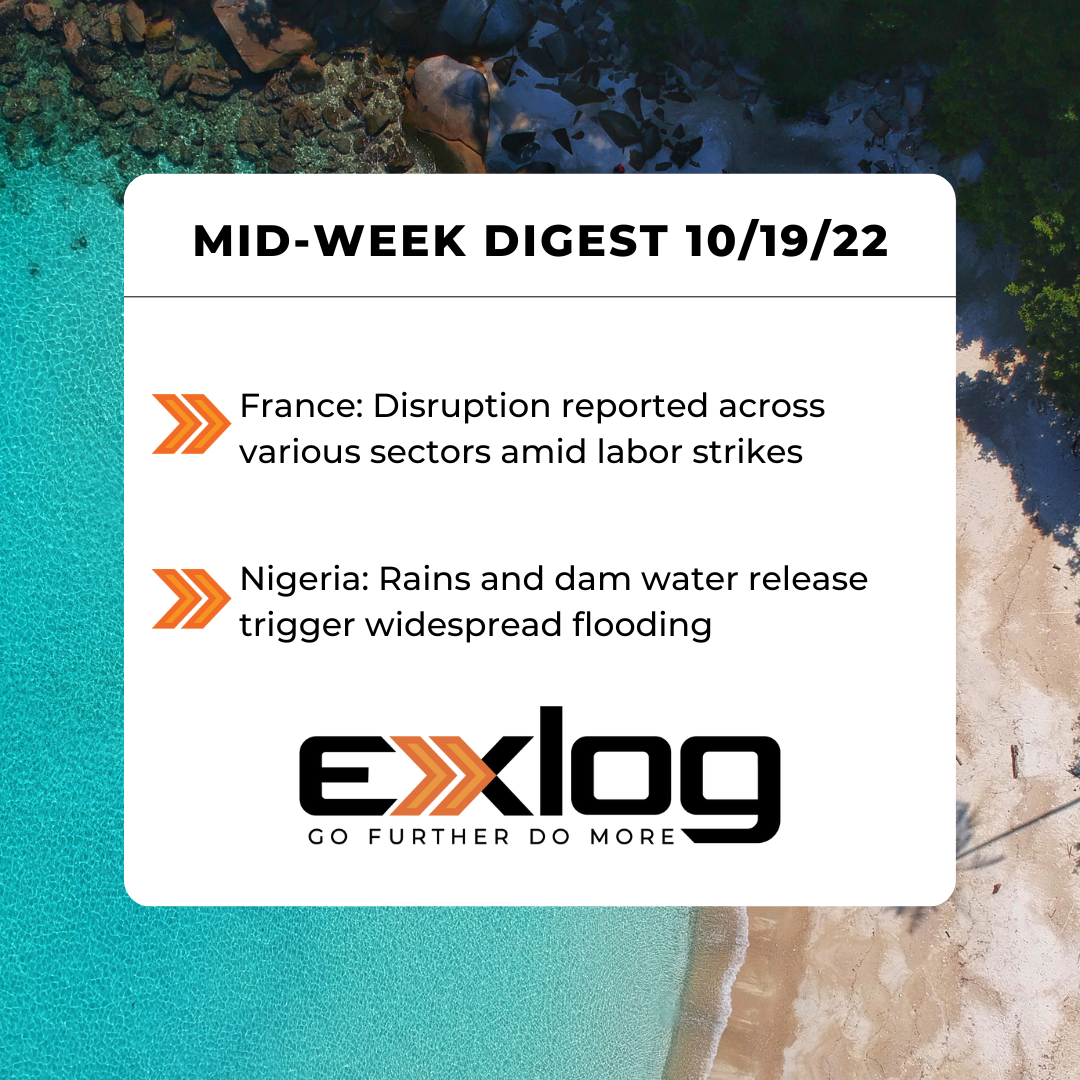Disruptive Labor Strikes in France and Widespread Flooding in Nigeria
France: Disruption Reported Across Various Sectors Amid Labor Strikes
Labor unions across France joined a nationwide strike on Oct. 18 to demand higher salaries amid rising inflation, prompting significant disruptions across numerous industries. In addition to oil refinery workers – whose walkouts have triggered interruptions to fuel distribution in northern and central France since late September – employees of the transportation, healthcare, education, and agriculture industries participated in the work stoppage, disrupting public transportation services and operations of educational institutions and medical facilities. The strikes have also spread to the nuclear energy sector and led to a reduction in power production due to a delay in maintenance activities at 17 out of 56 reactors. In addition, the protests have halted 50% of regional train services, resulting in rail cancelations between Paris and London. National lines have experienced minimal disruption, although demonstrations have affected public buses servicing the Paris region. While the majority of the demonstrations proceeded peacefully, several protests – including those in Paris – resulted in clashes with security forces and property damage on Oct. 18; at least 10 people sustained injuries while 15 others were arrested. In an attempt to quell labor action and normalize operations at oil refineries, TotalEnergies and ExxonMobil reached an agreement with the unions representing some of their workers on Oct. 14, although protests have continued at several sites. Nevertheless, the resumption of work at other refineries and depots has reduced fuel shortages at distribution centers; Prime Minister Elizabeth Borne said approximately 25% of France’s gas stations experienced shortages as of Oct. 18, compared to 55% last week. France derives approximately 70% of its electricity from nuclear energy and has historically been one of the largest exporters of electricity in Europe. Prolonged strikes at energy infrastructure facilities, particularly nuclear power plants, could increase the risk of electricity shortages in France and other European nations as Paris plays a pivotal role in resolving a wider energy crisis in the region amid the ongoing Russia-Ukraine conflict.
Nigeria: Rains and Dam Water Release Trigger Widespread Flooding
Monsoon rainfall has produced widespread flooding across Nigeria that has affected 31 of 36 states, exposing infrastructure and disaster preparedness failings. Although the rainy season started in April, rains have intensified since early October, triggering the worst flooding in a decade. In addition to the rainfall, neighboring Cameroon started releasing excess water from the Lagdo Dam on Sept. 13, further increasing water levels in Benue River and its tributaries and exacerbating flooding in the communities along the river. According to the Nigerian government, the flooding has killed more than 600 people, injured at least 2,407 others, and displaced 1.3 million. In addition, floods have destroyed more than 82,000 homes, damaged numerous roadways and other transportation infrastructure, and inundated 108,000 hectares (approximately 266,873 acres) of land, raising concerns about food insecurity. Nigeria LNG, Africa’s largest natural gas exporter, declared force majeure on Oct. 17 over disruptions to gas supply caused by high floodwater levels in several operational areas. The Nigerian government has begun distributing 12,000 metric tons of food and other goods to assist state and local governments with relief operations, although travel disruptions caused by inundated highways and bridges will likely complicate and delay recovery efforts. Nigerian meteorological agency has warned that flooding could continue across southern states – including Anambra, Delta, Rivers, Cross River and Bayelsa – until the end of November, likely triggering further disruptions to the oil and gas industry and resulting in additional casualties and civilian infrastructure damage.


